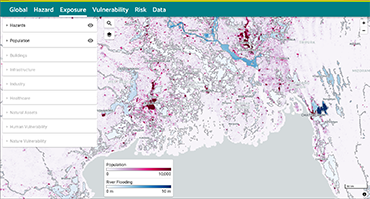A Global Resilience Index: Supporting climate adaptation of global infrastructure systems
A new Global Resilience Index, developed by researchers at the Environmental Change Institute, is helping policy makers understand climate risks to global infrastructure systems and plan appropriate investments and interventions.
 Understanding climate-related impacts on global infrastructure.
Understanding climate-related impacts on global infrastructure.Understanding climate-related impacts on global infrastructure is vital to attempts to adapt energy, transport, water, and digital technology systems to withstand climate change. But until recently the available datasets, and the methodologies with which to analyse them, have not been up to this task.
Now researchers at the Environmental Change Institute have developed a Global Resilience Index which will allow policy makers to understand climate impacts on infrastructure, help prioritise investment for adaptation, and ensure interrelated systems can withstand climate shocks.
‘Understanding climate risks to infrastructure systems is becoming extremely important,’ explains Professor Jim Hall. ‘Shocks in one sector, such as energy, can have significant impacts in other systems, such as transport – causing major disruption and damage. So financial regulators increasingly require investors to declare the physical climate risks they are exposed to, national governments need information for effective disaster risk reduction planning, and international institutions need help to guide fund allocation.’
‘But it’s a difficult task,’ continues Hall. ‘Climate risk analysis usually requires site specific information which is complex and expensive to obtain. The Index was made possible by the recent availability of satellite Earth observations (like night-time light observations, which show human activity), open-access datasets (such as OpenStreetMap), and the development of new computer models able to forecast extreme climatic events on a global scale.’
The Index was initially tested in global feasibility studies for the transport sector and on energy/transport networks in South-East Asia. A proof-of-concept was then developed, covering more than 100 countries, and presented at COP 26 – the Glasgow-based global climate meeting of world leaders in November 2021.
‘Shortly before CoP26, a number of high-level stakeholders – including the Insurance for Development Forum (IDF), the UN Office for Disaster Risk Reduction (UNDRR) and the Coalition for Disaster Resilient Infrastructure (CDRI)) – had called for the development of such an Index, which was also backed by climate envoy, Mark Carney,’ explains Hall. ‘The meeting gave us a great opportunity to showcase our model and generated a huge amount of interest and commitment to taking it forward.’
The EPSRC Impact Acceleration Account Technology Fund provided agile, just-in-time, money to accelerate the development of the demonstrator for CoP26, helping to leverage additional funds for the Index.
The Index has now become widely available through an open-access website allowing users to download robust and consistent datasets and models which can be adapted to their own contexts. The team continue to promote the Index through papers in academic journals, including Nature Communications, and working with partners IDF, UNDRR and CDRI to disseminate research results to non-academic audiences.
‘The potential impact of the Index is huge,’ continues Hall. ‘The UN Environment Programme estimates that developing countries will need up to USD $300 billion for climate adaptation by 2030, but it’s difficult to make the case for this level of funding without robust analysis of the risk and potential gains of any risk reduction strategies.
‘The Index will provide this analysis and encourage sustainable public and private investment to strengthen infrastructure resilience – which will support the transition to net zero climate emissions and, ultimately, protect the homes, lives, and livelihoods of millions of people around the world.’
Jim Hall is Professor of Climate and Environmental Risk at the School of Geography and the Environment at the University of Oxford, and leads the Oxford Programme for Sustainable Infrastructure Systems
Funders: EPSRC Impact Acceleration Account Technology Fund, Insurance for Development Forum, UK Centre for Greening Finance and Investment